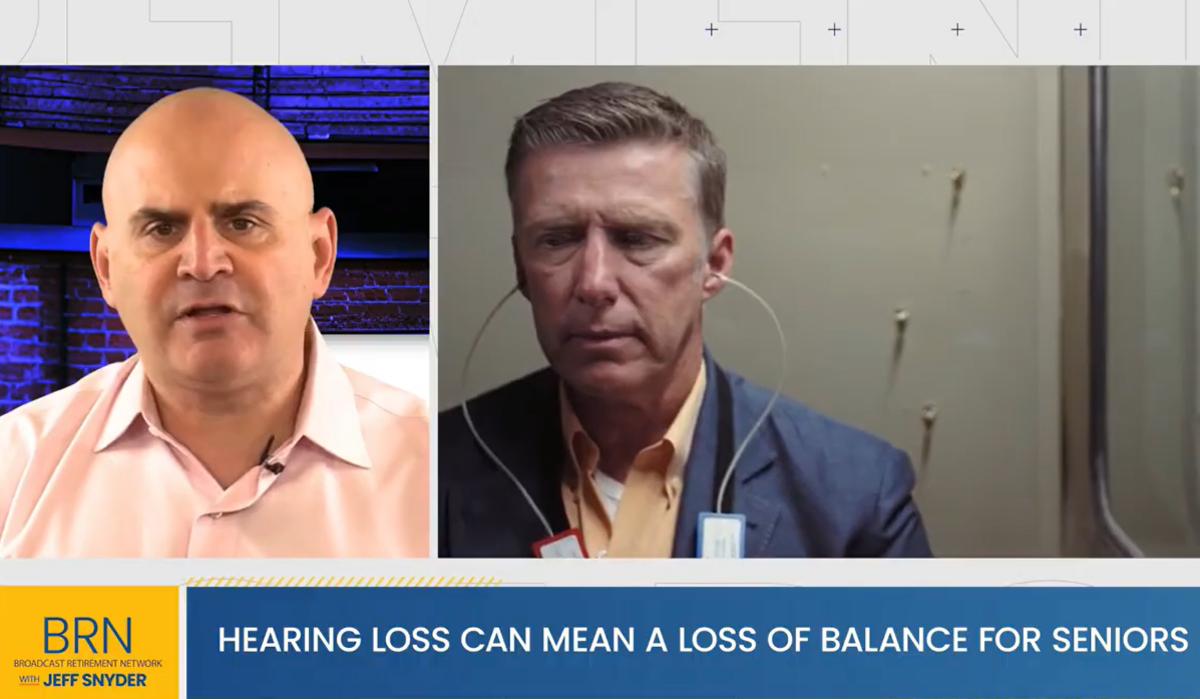Hearing Loss Can Mean a Loss of Balance for Seniors
Hearing loss can significantly impact balance in seniors because the inner ear also plays a crucial role in maintaining balance.

Balance disorders cause people to feel dizzy, lightheaded, and unsteady on their feet. Some people describe the room spinning around them while they remain perfectly still or the floor coming up at them, an experience otherwise known as vertigo. Broadcast Retirement Network's Jeffrey Snyder discusses how hearing loss can impact the balance of seniors with Sreekant Cherukuri, M.D., Clearcast Hearing.
Jeffrey H. Snyder, Broadcast Retirement Network
(0:03) This morning on BRN, hearing loss can mean a loss of balance for seniors. (0:10) Joining me now is Dr. Srikanth Shirakuri from the Relief Allergy and Sinus Institute. (0:17) Dr. Shirakuri, so great to see you. (0:18) Thanks for joining us this morning.
Sreekant Cherukuri, M.D., Clearcast Hearing
(0:20) Thank you for having me.
Jeffrey H. Snyder, Broadcast Retirement Network
(0:22) Let's talk about hearing loss because my understanding, and I want to get this from you, is as we age, we tend to lose a lot of things, but one of the things we may lose is a sense of our hearing. (0:34) Is that correct, sir? (0:35) And how does hearing loss potentially impact our seniors?
Sreekant Cherukuri, M.D., Clearcast Hearing
(0:40) You are correct. (0:41) It is the third most common chronic condition is hearing loss. (0:45) And a lot of us associate it with aging, just like maybe our vision, our dexterity, our joints, things that just naturally aren't going to be as sharp.
(0:53) But unlike those things, untreated hearing loss has been linked to a lot of other conditions, some of which are really serious in the elderly.
Jeffrey H. Snyder, Broadcast Retirement Network
(1:02) And in terms of those conditions, let's talk about that. (1:05) And one thing I think is social isolation, meaning if you can't hear, if I can't hear what you're saying, sir, and you can't hear what I'm saying, there's a disconnect. (1:17) But there are other maladies that are attributable to hearing loss, such as a loss of balance.
Sreekant Cherukuri, M.D., Clearcast Hearing
(1:24) Right. (1:24) I think we're all aware that it's harder to communicate with someone with hearing loss. (1:28) We may all have that person in our family.
(1:31) And we may think, oh, it's just we have to raise our voice or the TV is too loud. (1:34) But honestly, the last five to seven years, a lot of medical research has linked untreated hearing loss to higher risk of social isolation, as you identified, depression, anxiety, and more seriously, increased risk of dementia, losing your independence. (1:49) And more curiously, an increased risk of falling.
Jeffrey H. Snyder, Broadcast Retirement Network
(1:53) And falling. (1:55) I mean, if you fall, look, I mean, I fall down. (1:58) Ask my wife.
(1:59) I'm 52. (2:00) I fall down from time to time. (2:01) I might bang my leg or my hip.
(2:04) If a senior falls due to osteoporosis, they could have some significant damage to their bodies and it could create a whole catastrophic set of events, sir.
Sreekant Cherukuri, M.D., Clearcast Hearing
(2:15) That is right. (2:15) It's actually a leading cause of death in the elderly is falls. (2:19) And, you know, certainly morbidity in terms of having to have surgery and rehab and then losing your mobility and independence.
(2:27) And we think about that. (2:28) Why are we thinking that falls and hearing loss are linked? (2:32) Maybe you think, oh, I was stumbling or the shoe didn't fit or the balance is off.
(2:36) So it turns out there are three inputs to the brain that help us keep our balance. (2:42) One is the eyes. (2:43) As you know, it's harder to see in the dark and you might stumble.
(2:46) One is the joints of the feet. (2:48) And the other is the hearing. (2:50) And the hearing is the one that's neglected.
(2:51) But actually, anatomically, the nerve that controls hearing, it's called the vestibulocochlear nerve. (2:58) It's both hearing and balance. (3:00) Vestibular means balance.
(3:01) And so as our hearing degrades, so does our balance. (3:04) And we don't think about the balance part, which could be really serious.
Jeffrey H. Snyder, Broadcast Retirement Network
(3:09) So, doctor, how do we, can we test for this? (3:13) We can test for hearing loss, but should, if you were a senior at, let's just say, 50, 60, should you be tested with an audiologist? (3:22) How do you go about ensuring that you don't have the hearing loss that could preform a balance disruption?
Sreekant Cherukuri, M.D., Clearcast Hearing
(3:32) Hearing loss is quite prevalent. (3:34) It's one in three people over the age of 65 to 74. (3:38) And then it goes as high as 90% of people over 85.
(3:42) And so most people, as we get older, are going to have hearing loss. (3:45) What we don't think about is the risk to the balance system. (3:49) So certainly get a hearing test, but if it shows even mild hearing loss, you have a three times higher risk of falling than someone with normal hearing.
(3:56) And it goes as up to five times higher risk of falling as the hearing loss gets more severe. (4:02) So there's a couple things there. (4:04) Certainly start out with a hearing test if you feel like your hearing is not as sharp as it used to be or a family member says that.
(4:13) And the other things you can do specifically for the balance are, if you feel like you're stumbling or you are finding your way, it's very important, and I order this every week on patients, is physical therapy for the balance system. (4:25) Just like any muscle, use it or lose it, any skill or sensory, we have to keep it sharp. (4:32) That goes for the hearing and the balance.
(4:33) And with balance, it's specifically physical therapy. (4:36) And for the hearing, you know, everyone knows what hearing aids are. (4:39) And the unfortunate truth of the matter is only one in four people that have hearing loss wear a hearing aid.
(4:45) There is a variety of reasons for that. (4:48) But what we have learned as ear, nose and throat doctors and experts in the industry is we've been putting hearing aids or pushing hearing aids on everybody with hearing loss, and we don't give them other options. (4:58) Let's go back to your mobility example.
(5:01) Let's say a family member stumbles or falls and has a mobility issue, but the only option was a wheelchair. (5:07) That certainly works for some people, but it doesn't work for those that might benefit from just a cane or a walker. (5:13) We don't have those other options in hearing loss until now.
(5:17) And so the key we know from the medical studies, we've just got to keep the ears sharp. (5:22) The ear and brain connection keeps that both the hearing and the balance sharp. (5:26) If you tried hearing aids or you don't want a hearing aid, there are now other options.
(5:30) I'm actually wearing a device. (5:32) It's an FDA-registered device called ClearCast. (5:35) It's a conversation amplifying wearable that you wear on your neck.
(5:39) It has a hearing aid component here, a very comfortable earbud that you put in when you want to hear. (5:44) And it can rest down on your shirt or shoulders when you don't want to hear. (5:48) But it is another way we can keep the hearing and the balance system sharp because it engages that part of the brain and the ear anatomy.
(5:58) And that is, I think, going to be a big breakthrough to help people understand that, hey, if you have trouble hearing, you're not only going to have this one option. (6:05) There are other options as well.
Jeffrey H. Snyder, Broadcast Retirement Network
(6:07) And, you know, is there a stigma? (6:09) You know, I can think about the old, you know, I'm 52 years old, as I said, so I remember the old form of hearing aids where they were external, sit above your ear or on your ear and you can see it. (6:22) But today, doctor, they're so tiny that you don't even see them.
(6:28) So why the hang up with people not wanting to wear them? (6:33) Is it maybe they just don't want to hear the people, their loved ones? (6:36) They have a wife or a husband they don't want to hear.
Sreekant Cherukuri, M.D., Clearcast Hearing
(6:38) Right. (6:39) So I think most people would like to hear, but you're correct. (6:41) Hearing aids have a stigma.
(6:43) They used to be clunky looking, for lack of a better word, and they are now much more technologically advanced. (6:51) They are more invisible. (6:52) They are rechargeable, so you don't have to change batteries.
(6:55) They can connect to a smartphone, so they're more capable. (6:58) They're even more available. (7:00) They're now over-the-counter for early stage hearing loss.
(7:03) And they're more affordable if you go with the over-the-counter or other options. (7:07) But despite all of that advancement, it's only 24% of people with hearing loss wear hearing aids. (7:13) So you know what that tells us?
(7:14) This is not a marketing problem. (7:16) This is not a product problem. (7:19) This is the fact that people want other options besides hearing aids to help them hear better.
Jeffrey H. Snyder, Broadcast Retirement Network
(7:24) So those options, I'm sorry, doctor, finish your thought.
Sreekant Cherukuri, M.D., Clearcast Hearing
(7:27) Just going to say that's where I think the industry has been missing is we keep making these amazing things that might be really good for people your age or my age. (7:35) I'm also 52. (7:36) They connect to the smartphone.
(7:37) They do automatic this. (7:38) They do that. (7:39) But that's actually really complicated for someone elderly to have to open up a smartphone, go to an app, make a change, just to change the volume.
Jeffrey H. Snyder, Broadcast Retirement Network
(7:47) Yeah. (7:48) Yeah. (7:49) I mean, a lot of people don't want the complexity.
(7:51) Doctor, you also talked about the physical therapy element of this. (7:55) Look, we have a sedentary, a lot of us are sedentary, maybe a percentage of us work out. (8:02) Are there steps that we can take in advance of getting physical therapy to improve our balance?
(8:10) I mean, you mentioned you would see a therapist, but is it doing yoga? (8:14) Is it going out for a walk with a spouse or a loved one? (8:17) Are there things we can do leading up to getting that physical therapy?
Sreekant Cherukuri, M.D., Clearcast Hearing
(8:22) Absolutely, and you nailed it. (8:23) Exercise is the number one most important thing to improve strength and balance. (8:28) Exercise, depending on your comfort level as a patient or a person, is to start with walking.
(8:34) You can start with walking with sticks. (8:35) You see people that help give you a little more balance, all the way up to, like you mentioned, yoga. (8:40) Maybe get into a fitness center, get on a treadmill if it's bad weather, or like an elliptical-type machine, swimming.
(8:47) Any of those things help keep the muscles, the brain, and everything sharp. (8:53) Physical therapy is for those people that are actually starting to see signs of trouble. (8:56) You don't go there if you don't have a challenge already.
(9:00) And then another thing that is common sense, but we don't think about until later, is the home and office environment. (9:07) Remove the trip hazards. (9:08) Make sure there's railings on the stairs, for example, non-slip mat in the shower.
(9:14) Those are little easy things you could think about to help prevent, but I do think this podcast or this webinar is really valuable. (9:23) People should start thinking about prevention, not only treating falls and hearing loss after it's too late.
Jeffrey H. Snyder, Broadcast Retirement Network
(9:29) Yeah, I love that you talked about being proactive versus reactive. (9:33) I think that's, in general, where medicine is heading, is my understanding. (9:38) Doctor, we're going to have to leave it there.
(9:39) Thank you so much for joining us, and we look forward to having you back on the program again very soon, sir.
Sreekant Cherukuri, M.D., Clearcast Hearing
(9:44) Really appreciate you covering this important topic. (9:46) Thank you.
Jeffrey H. Snyder, Broadcast Retirement Network
(9:47) And don't forget to subscribe to our daily newsletter, The Morning Pulse, for all the news in one place. (9:51) Details, of course, at our website. (9:53) And we're back again tomorrow for another edition of BRN.
(9:56) Until then, I'm Jeff Snyder. (9:57) Stay safe, keep on saving, and don't forget, roll with the changes.
What's Your Reaction?




















































